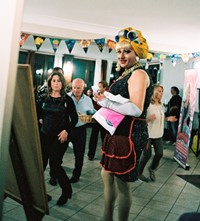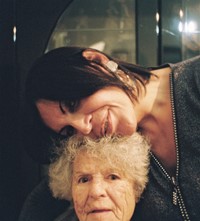Jess Kohl’s photo story shines a light on the ‘Femminielli’ of Campania, Italy
- TextMiss Rosen
Deep in the heart of Campania, Italy, there is a community of Femminielli, an ancient example of gender fluidity that lives on through tradition. Taking their name from the combination of femmina (female) and -ello (masculine diminutive suffix), the Femminiello have long been honoured in Neapolitan culture.
Historically believed to bring good luck, the Femminielli once held a relatively privileged position in Catholic culture. Drawn to the intersection of gender non-conformity, religion and culture, British filmmaker and photographer Jess Kohl embarked on Queens of Scampia, an ongoing series looking at the diversity of gender and sexuality across the region and questioning if historic liberal attitudes toward queerness continue to thrive. Here, Kohl speaks about the ways in which a sense of belonging can help us exist in harmony within ourselves and with one another.
“Campania is a region where Catholicism, gender nonconformity and strong cultural traditions are uniquely present and exist in harmony. Historically, nonbinary people were accepted and celebrated – I was interested to find out if these attitudes still existed.
“I wanted to explore if these historic attitudes of openness had trickled down through generations and helped to create an attitude of tolerance. I embarked on a journey through Naples, meeting individuals from across the queer spectrum – from non-binary youth in the city centre, to older trans women in Scampia. I felt particularly drawn to the Scampia community – there’s a strong sense of pride here, which continues to thrive in the face of hardship. It’s a notoriously dangerous area, but I felt very safe being here with this community because they are respected.
“It’s important that the work I make is collaborative, and that the communities I document want to be seen. In Scampia, there’s a glamour associated with having your photo taken. The people I photographed would suggest different iconic locations in the area for us to shoot, and they were very open about their life experiences and welcomed me into their homes. Many of the people I met here work in ‘entertainment’, hosting Tombola (bingo) nights and drag shows. This seems to be true to queer communities globally; I think being placed in the role of entertainer is a way for the mainstream to pigeonhole queerness – if it exists to entertain them, it’s acceptable.
“This was an initial research trip to Campania, and I feel like I’ve just begun to scratch the surface of the history and tradition of femminielli culture, and how it’s bled into modern day attitudes in the region, how it differs between the city and countryside, how it’s changed between generations.”















